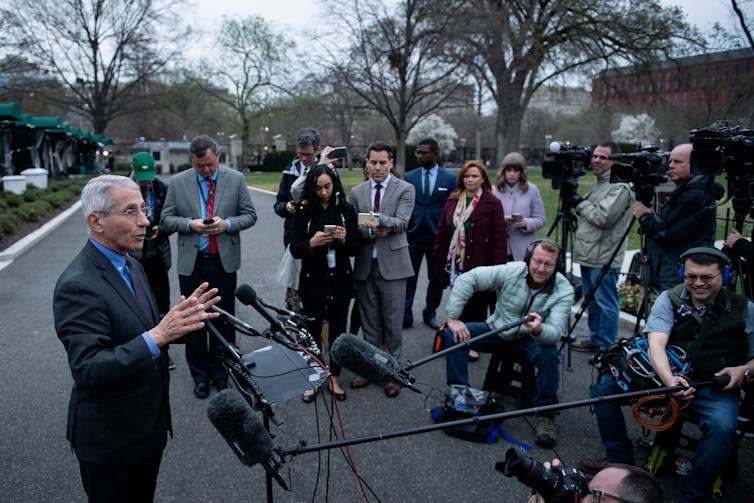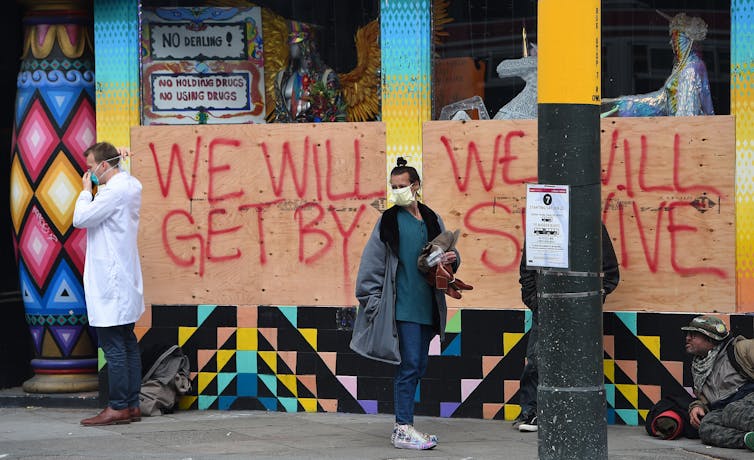3 ways the coronavirus pandemic is changing who we are
- Written by Arie Kruglanski, Professor of Psychology, University of Maryland
For most Americans, the coronavirus pandemic represents a completely unprecedented circumstance, as novel as it is life-changing. No event in recent history has affected us as profoundly and pervasively.
Not only does it remind us of our physical fragility, it undermines economic security, throws daily routines topsy-turvy, wreaks havoc on plans and isolates us from friends and neighbors.
I am a psychologist[1] who studies human motivation and its impact on what we feel[2], how we think and what we do. I see that little by little, the stressful external forces this pandemic unleashed are exerting a deep internal effect. Little by little, they are changing who we are and how we relate to people and the world.
The pandemic affects our psyches three ways: It influences how we think, how we relate to others and what we value.
 The public has a growing need for answers during the coronavirus pandemic and the National Institutes of Health’s Dr. Anthony Fauci, left, has responded to that need.
Getty/Brendan Smialowski / AFP[3]
The public has a growing need for answers during the coronavirus pandemic and the National Institutes of Health’s Dr. Anthony Fauci, left, has responded to that need.
Getty/Brendan Smialowski / AFP[3]
Changed sense of security
This crisis has induced wide reaching uncertainty. We do not know what to think or how to make heads or tails of these completely unfamiliar circumstances.
Who will be affected? Will our loved ones? How quickly? Will tests be available? Will we survive? How long will this last? What about our work? Our income?
The combination of uncertainty and danger is a recipe for severe angst. It feeds an intense desire for certainty, better known to psychologists as the need for cognitive closure[4].
Once aroused, the need for closure fosters the craving for reliable information, the acute desire to dispel the paralyzing ambiguity that engulfs us. We long for clarity and guidance, a “light at the end of the tunnel” – a tunnel that at this moment appears without end.
Glued to our TV sets, we become breaking news junkies, hoping against hope that the next cycle will finally provide the enlightenment that keeps eluding us.
Research on the need for closure tells us much more: Under conditions of diffuse uncertainty, people are drawn, as if by a magnet, to simplistic solutions and black-and-white reasoning[5].
Some gravitate to the pole of denial that nothing is wrong at all, others to that of utter panic, the belief that the worst is sure to come and that the end is near[6]. Rumors are circulated widely and seized upon uncritically[7].
This is the time where steady, reassuring leadership is desperately needed. It is the time, too, when authoritative, confident direction is much preferred over flexible, laissez-faire guidance[8].
We need to be told what to do, plain and simple. This is no time for complex deliberations.
Changed needs
When their need for closure rises, people become “group-centric,”[9] which means they yearn for cohesion and unity.
Patriotism is elevated[10] but so, often, is nationalism, the idea that our nation is superior to others, better at handling the crisis that foreigners have propagated to begin with[11].
The coronavirus pandemic is scary. Everyone can be infected. No one is exempt. No matter what your station in life, your status, power or popularity, the virus still can get you.
This possibility evokes an overriding sense of fragility and vulnerability. Ample research attests that with one’s feelings of control and personal agency at an ebb – such as in infancy, in sickness or old age – one’s dependence on others rises[12].
This prompts putting social relations at a premium, strengthening one’s attachment to others, boosting the appreciation of one’s loved ones, family and friends.
One consequence of our helplessness in face of the pandemic is our greater sociability, a yearning for warmth and succor, the realization that we need others, that we cannot hack it alone[13].
 In the pandemic, people value those who sacrifice their self interests for the common good. Here, a a doctor with San Francisco’s Haight Ashbury Free Clinic prepares to talk with homeless people about the coronavirus.
Getty/Josh Edelson / AFP[14]
In the pandemic, people value those who sacrifice their self interests for the common good. Here, a a doctor with San Francisco’s Haight Ashbury Free Clinic prepares to talk with homeless people about the coronavirus.
Getty/Josh Edelson / AFP[14]
Changed values
Along with the growing attachment to others comes a subtle shift in our morals.
Communal values of cooperation, consideration and caring are prioritized, whereas individualistic ones of prestige, popularity and power lose some of their cachet[15].
Our cultural ideals morph accordingly. In times of crisis, we celebrate and accord major significance to persons who serve communitarian values, extend a helping hand to others, sacrifice their self-interests for the common good, exhibit empathy and model humanity[16].
Fascination with fame and riches is diminished; it takes a back seat to admiration for simple acts of kindness[17].
The coronavirus pandemic alters who we are, affecting diverse facets of our psyche.
We may approve of some of the changes – toward stronger communal bonds and humanitarian values – and disapprove of others – closed-mindedness, black-and-white thinking. Whether we like it or not, the immense crisis we are facing brings out the best in us, but also the worst in us.
[Get facts about coronavirus and the latest research. Sign up for our newsletter.[18]]
References
- ^ I am a psychologist (psyc.umd.edu)
- ^ who studies human motivation and its impact on what we feel (scholar.google.gr)
- ^ Getty/Brendan Smialowski / AFP (www.gettyimages.com)
- ^ the need for cognitive closure (www.researchgate.net)
- ^ to simplistic solutions and black-and-white reasoning (psycnet.apa.org)
- ^ that the end is near (www.theatlantic.com)
- ^ seized upon uncritically (www.buzzfeednews.com)
- ^ preferred over flexible, laissez-faire guidance (psycnet.apa.org)
- ^ people become “group-centric,” (www.academia.edu)
- ^ Patriotism is elevated (www.theguardian.com)
- ^ foreigners have propagated to begin with (foreignpolicy.com)
- ^ one’s dependence on others rises (psycnet.apa.org)
- ^ that we cannot hack it alone (www.bbc.com)
- ^ Getty/Josh Edelson / AFP (www.gettyimages.com)
- ^ lose some of their cachet (www.bbc.com)
- ^ exhibit empathy and model humanity (www.bbc.com)
- ^ admiration for simple acts of kindness (www.washingtonpost.com)
- ^ Sign up for our newsletter. (theconversation.com)
Authors: Arie Kruglanski, Professor of Psychology, University of Maryland
Read more https://theconversation.com/3-ways-the-coronavirus-pandemic-is-changing-who-we-are-133876

